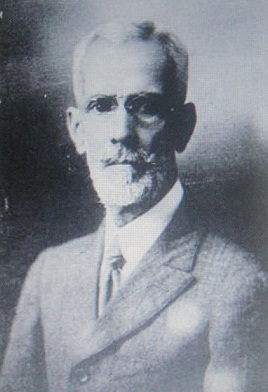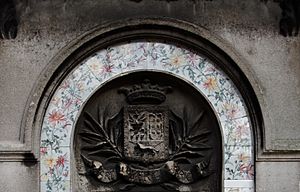Trinidad Pardo de Tavera facts for kids
Quick facts for kids
Trinidad Pardo de Tavera
|
|
|---|---|
 |
|
| Member of the Malolos Congress from Cebu | |
| In office September 15, 1898 – November 13, 1899 Serving with Ariston Bautista, Felix David, and Francisco Macabulos
|
|
| Personal details | |
| Born |
Trinidad Hermenegildo José María Juan Francisco Pardo de Tavera y Gorricho
13 April 1857 Escolta, Manila, Captaincy General of the Philippines |
| Died | 26 March 1925 (aged 67) Manila, Philippine Islands |
| Children | Carlos Pardo de Tavera Alfredo Pardo de Tavera Carmen Pardo de Tavera (later Carmen Pardo de Tavera de González) |
| Parents | Félix Pardo de Tavera Juliana Gorricho de Pardo de Tavera |
| Relatives | Juan VI Pardo de Tavera (ancestor) Félix Pardo de Tavera, hijo María de la Paz Pardo de Tavera de Luna (sister) |
| Education | Ateneo Municipal de Manila Colegio de San Juan de Letran University of Santo Tomas University of Paris |
| Occupation | Writer, physician, naturalist, historian |
Trinidad Hermenegildo José María Juan Francisco Pardo de Tavera y Gorricho (born April 13, 1857 – died March 26, 1925) was a Filipino doctor, historian, and politician. He was known for his many writings about Philippine culture. He also served as a leader in the Philippine government in 1899.
Trinidad was also known by his shorter name, T. H. Pardo de Tavera. He was a very important person in Philippine history.
Contents
Family Background
Trinidad was born on April 13, 1857, in Manila. His father, Félix Pardo de Tavera, was a Spanish lawyer and government official. His mother, Juliana Gorricho, came from a very rich and respected Filipino family.
The Pardo de Tavera family had a long history. His father's family came from a noble Portuguese family. They added "de Tavera" to their name to show their origin. One famous ancestor was Juan VI Pardo de Tavera. He was a powerful Archbishop and Grand Inquisitor in Spain.
Trinidad's grandfather, Julián Pardo de Tavera, moved to Manila in 1825. He had three children there, including Trinidad's father, Félix. The family lived in a grand house in Intramuros, Manila.
Trinidad's mother's family, the Gorrichos, were also very wealthy. His grandfather, José Dámaso Gorricho, owned a lot of land. He also ran the biggest money-lending company at that time. His grandmother, Ciriaca de los Santos, was a smart Filipino businesswoman. She made a fortune selling hay for horses.
Félix and Juliana had three children: Trinidad, his brother Félix hijo, and his sister María de la Paz. María de la Paz later married the famous Filipino painter Juan Luna.
Early Life and Education
In his younger years, Trinidad was called Trini. He was considered "cuarteron," meaning he was three-fourths Spanish. His family's house was near important buildings in Manila. These included the main square and the Manila Cathedral.
In 1870, part of their house was rented out. This helped start the Academia de Dibujo y Pintura. It was the first art school supported by the government in the Philippines.
Trini's father died in 1864. His uncle, Joaquín, became like a father to Trini and his siblings. Joaquín was given an important government position. This was one of the highest honors in the Philippines back then.
In 1868, a revolution happened in Spain. Joaquín became involved in pushing for reforms in the Philippines. However, things changed in 1872. A mutiny broke out in Cavite. Joaquín was wrongly accused and sent to prison. He was later deported to Guam. After three years, he was pardoned. But he chose to live in Paris instead of returning to Manila.
Trinidad continued his studies during these times. He finished his early education at Ateneo de Manila University. He earned his Bachelor of Arts degree in 1873. This was from Colegio de San Juan de Letran. By 1875, he was studying medicine at University of Santo Tomas. Then, his uncle Joaquín invited him to Paris to continue his education.
Life and Studies in Paris
In Paris, the Pardo de Tavera family made friends with powerful French politicians. These included Prime Minister Léon Gambetta. They lived off the money from their properties in the Philippines.
Trinidad enrolled at the University of Paris to finish his medical degree. He learned from famous professors there. He also met Russian students who shared their ideas about social change.
In 1880, Trinidad earned his medical license in Paris. He also studied the Malay language. While studying, he collected many rare books and maps. These books were about the Philippines, its culture, and history. He also wrote medical articles for journals.
He wrote important works about Filipino languages. One was Contribución para el estudio de los antiguos alfabetos Filipinos (1884). Another was El sánscrito en la lengua tagala (1887). This book looked at how the ancient Sanskrit language influenced the Tagalog language. Even Jose Rizal, a national hero, was impressed by Trinidad's knowledge of Sanskrit.
Career and Contributions
Trinidad Pardo de Tavera was the first Filipino to publish a medical article in a professional journal. This article was called La medicine a l'Ile de Luzon, Archipel des Philippine.
Later, President Emilio Aguinaldo appointed him. He became the Director of the Division on Diplomacy in 1898. He resigned because he believed the Philippines should not seek immediate independence. He thought it was better for the country to work with the United States.
In 1901, he published a report. It was about the origins of the names of different groups of people in the Philippines. He dedicated this work to Professor Dean Worcester.
In 1906, he wrote a historical review of the Philippines. It covered history from its discovery until 1903. Some religious leaders did not like this book.
A famous scholar, Ferdinand Blumentritt, once said that Trinidad Pardo de Tavera and Jose Rizal were "the only learned scholars of Malaysia produced by Spain." This shows how highly he was regarded.
During the American rule, Trinidad was seen as someone who understood American plans for the Philippines. He worked closely with Governor Taft. He believed that the Philippines should become part of the "American union." He thought this was the best path for Filipinos.
Personal Views
Trinidad Pardo de Tavera was very smart and could understand many languages. These included Spanish, French, German, Italian, English, and Russian. He read books by many important thinkers.
He was inspired by the German philosopher Immanuel Kant. Kant's ideas taught him that reason guides what is right. He believed that people should be free and control themselves. This influenced his dislike for special privileges for certain groups. He also thought society evolved, like Auguste Comte described. He believed the Philippines was moving towards a more modern stage.
Death
Trinidad Pardo de Tavera passed away on March 26, 1925. He died in his bedroom in Manila. His sons thought he was just taking a nap. His body was cremated. His ashes were buried next to his mother's grave in Paris.
See also
 In Spanish: Trinidad Pardo de Tavera para niños
In Spanish: Trinidad Pardo de Tavera para niños
 | William L. Dawson |
 | W. E. B. Du Bois |
 | Harry Belafonte |


